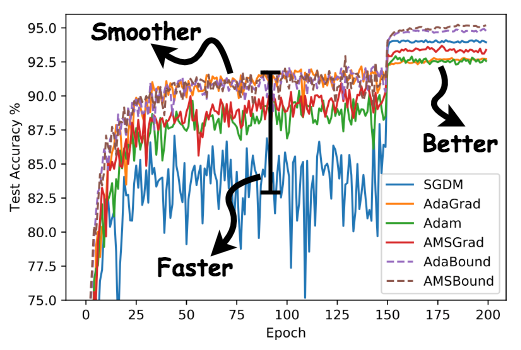https://github.com/Luolc/AdaBound
An optimizer that trains as fast as Adam and as good as SGD.
https://github.com/Luolc/AdaBound
Last synced: 8 months ago
JSON representation
An optimizer that trains as fast as Adam and as good as SGD.
- Host: GitHub
- URL: https://github.com/Luolc/AdaBound
- Owner: Luolc
- License: apache-2.0
- Created: 2019-02-15T18:05:20.000Z (almost 7 years ago)
- Default Branch: master
- Last Pushed: 2023-07-23T10:44:20.000Z (over 2 years ago)
- Last Synced: 2025-03-22T09:06:50.015Z (9 months ago)
- Language: Python
- Homepage: https://www.luolc.com/publications/adabound/
- Size: 2.59 MB
- Stars: 2,910
- Watchers: 70
- Forks: 336
- Open Issues: 19
-
Metadata Files:
- Readme: README.md
- License: LICENSE
Awesome Lists containing this project
- Awesome-pytorch-list - AdaBound
- awesome-python-machine-learning-resources - GitHub - 72% open · ⏱️ 06.03.2019): (Pytorch实用程序)
- Awesome-pytorch-list-CNVersion - AdaBound
- awesome-computer-vision-papers - 2019ICLR - example]](https://github.com/taki0112/AdaBound-Tensorflow) (DeepCNN / Optimization)
README
# AdaBound
[](https://pypi.org/project/adabound/)
[](https://pypi.org/project/adabound/)
[](https://pypi.org/project/adabound/)
[](./LICENSE)
An optimizer that trains as fast as Adam and as good as SGD, for developing state-of-the-art
deep learning models on a wide variety of popular tasks in the field of CV, NLP, and etc.
Based on Luo et al. (2019).
[Adaptive Gradient Methods with Dynamic Bound of Learning Rate](https://openreview.net/forum?id=Bkg3g2R9FX).
In *Proc. of ICLR 2019*.

## Quick Links
- [Website](https://www.luolc.com/publications/adabound/)
- [Demos](./demos)
## Installation
AdaBound requires Python 3.6.0 or later.
We currently provide PyTorch version and AdaBound for TensorFlow is coming soon.
### Installing via pip
The preferred way to install AdaBound is via `pip` with a virtual environment.
Just run
```bash
pip install adabound
```
in your Python environment and you are ready to go!
### Using source code
As AdaBound is a Python class with only 100+ lines, an alternative way is directly downloading
[adabound.py](./adabound/adabound.py) and copying it to your project.
## Usage
You can use AdaBound just like any other PyTorch optimizers.
```python3
optimizer = adabound.AdaBound(model.parameters(), lr=1e-3, final_lr=0.1)
```
As described in the paper, AdaBound is an optimizer that behaves like Adam at the beginning of
training, and gradually transforms to SGD at the end.
The `final_lr` parameter indicates AdaBound would transforms to an SGD with this learning rate.
In common cases, a default final learning rate of `0.1` can achieve relatively good and stable
results on unseen data.
It is not very sensitive to its hyperparameters.
See Appendix G of the paper for more details.
Despite of its robust performance, we still have to state that, **there is no silver bullet**.
It does not mean that you will be free from tuning hyperparameters once using AdaBound.
The performance of a model depends on so many things including the task, the model structure,
the distribution of data, and etc.
**You still need to decide what hyperparameters to use based on your specific situation,
but you may probably use much less time than before!**
## Demos
Thanks to the awesome work by the GitHub team and the Jupyter team, the Jupyter notebook (`.ipynb`)
files can render directly on GitHub.
We provide several notebooks (like [this one](./demos/cifar10/visualization.ipynb)) for better
visualization.
We hope to illustrate the robust performance of AdaBound through these examples.
For the full list of demos, please refer to [this page](./demos).
## Citing
If you use AdaBound in your research, please cite [Adaptive Gradient Methods with Dynamic Bound of Learning Rate](https://openreview.net/forum?id=Bkg3g2R9FX).
```text
@inproceedings{Luo2019AdaBound,
author = {Luo, Liangchen and Xiong, Yuanhao and Liu, Yan and Sun, Xu},
title = {Adaptive Gradient Methods with Dynamic Bound of Learning Rate},
booktitle = {Proceedings of the 7th International Conference on Learning Representations},
month = {May},
year = {2019},
address = {New Orleans, Louisiana}
}
```
## Contributors
[@kayuksel](https://github.com/kayuksel)
## License
[Apache 2.0](./LICENSE)